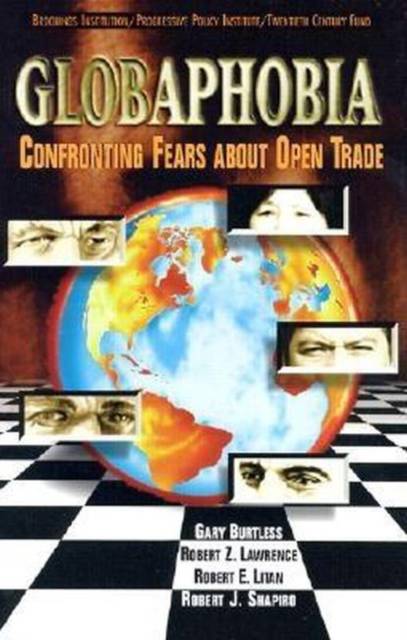
- Retrait gratuit dans votre magasin Club
- 7.000.000 titres dans notre catalogue
- Payer en toute sécurité
- Toujours un magasin près de chez vous
- Retrait gratuit dans votre magasin Club
- 7.000.0000 titres dans notre catalogue
- Payer en toute sécurité
- Toujours un magasin près de chez vous
Globaphobia
Confronting Fears about Open Trade
Gary Burtless, Robert Z Lawrence, Robert E Litan, Robert J ShapiroDescription
For much of the post-World War II period, the increasing globalization of the U.S. economy was welcomed by policymakers and by the American people. We gained the benefits of cheaper and, in some cases, better foreign-made products, while U.S. firms gained wider access to foreign markets. The increasing economic interlinkages with the rest of the world helped promote capitalism and democracy around the globe. Indeed, we helped win the Cold War by trading and investing with the rest of the world, in the process demonstrating to all concerned the virtues of trade and markets. In recent years, however, a growing chorus of complaints has been lodged against globalization--which is blamed for costing American workers their jobs and lowering their wages. The authors of this book speak directly and simply to these concerns, demonstrating with easy prose and illustrations why the globaphobes are wrong. Globalization has not cost the United States jobs. Nor has it played any more than a small part in the disappointing trends in wages of many American workers. The challenge for all Americans is to embrace globalization and all of the benefits it brings, while adopting targeted policies to ease the very real pain of those few Americans whom globalization may harm. Globaphobia outlines a novel, yet sensible program for advancing this objective. Copublished with the Twentieth Century Fund and the Progressive Policy Institute
Spécifications
Parties prenantes
- Auteur(s) :
- Editeur:
Contenu
- Nombre de pages :
- 162
- Langue:
- Anglais
Caractéristiques
- EAN:
- 9780815711902
- Date de parution :
- 01-02-98
- Format:
- Livre relié
- Format numérique:
- Genaaid
- Dimensions :
- 161 mm x 238 mm
- Poids :
- 512 g

Les avis
Nous publions uniquement les avis qui respectent les conditions requises. Consultez nos conditions pour les avis.






